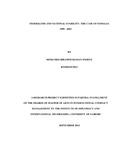| dc.description.abstract | The research examines federalism and national stability in Somali. The overall objectives and hypotheses of the study include to provide an overview of the federalist debates and effects on national stability in Somalia. international interventions influence and lack of a central authority on federalism and national stability in Somalia. The research looks into the historical overview on federalism and national stability in Somalia. chapter one introduces the study, chapter two and three focuses on clan identity on federalism and national stability and the influence of international interventions on federalism and national stability respectively. chapter four is a critical analysis of the study and highlights key findings and emerging issues such as the absence of a central authority, the role of international actors and clanism as an issue in Somalia. The researcher's recommendations are mainly in line with the need for judiciary to build strong, independent legal institutions, addressing the issue of clanism, building trust and security and the need to go beyond state building. | en_US |

